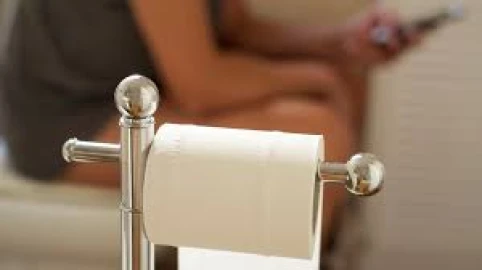J
Jelilah Daud
Guest
doctype html>

While hemorrhoids are frequently associated with a low-fiber diet, pregnancy, obesity, or chronic constipation, doctors warn that they can also result from a much more unexpected cause: spending too much time on the toilet.
Many people take pride in eating well, exercising regularly, and maintaining good health—only to be caught off guard by conditions such as hemorrhoids.
Even the most disciplined routines cannot protect against this unpleasant ailment.
While hemorrhoids are frequently associated with a low-fiber diet, pregnancy, obesity, or chronic constipation, doctors warn that they can also result from a much more unexpected cause: spending too much time on the toilet.
Experts explain that prolonged sitting, particularly on modern toilet seats, causes constant downward pressure on the rectal area.
This posture causes blood to pool in the veins surrounding the anus, resulting in swelling, itching, pain, and, in some cases, bleeding.
The habit has only been worsened by smartphones.
What was once a quiet break for reading newspapers or magazines has transformed into endless scrolling sessions in bathrooms.
For parents, the toilet may even feel like a brief escape from the demands of childcare. But that “extra five minutes” can quietly fuel a medical condition that leaves many baffled as to why they suffer despite leading healthy lifestyles.
Hemorrhoids develop gradually, often unnoticed until the discomfort sets in.
They don’t spread from person to person and are rarely dangerous, yet the stigma surrounding them keeps many from seeking help. Sufferers often remain silent, even though millions globally deal with the condition daily.
Doctors emphasize that the first line of treatment usually involves simple lifestyle adjustments: eating fiber-rich foods such as fruits and vegetables, drinking more water, and engaging in regular exercise to ease bowel movements. But beyond medical advice, health experts say the most crucial step is openness.
“Talking about hemorrhoids helps break the stigma,” notes one physician. “It encourages people to seek care early instead of suffering in silence.”
©Citizen Digital, Kenya
Continue reading...
- While hemorrhoids are often associated with a low-fiber diet, pregnancy, obesity, or chronic constipation, doctors caution that they can also arise from a much more unsuspecting culprit: spending too long on the toilet.

While hemorrhoids are frequently associated with a low-fiber diet, pregnancy, obesity, or chronic constipation, doctors warn that they can also result from a much more unexpected cause: spending too much time on the toilet.
Many people take pride in eating well, exercising regularly, and maintaining good health—only to be caught off guard by conditions such as hemorrhoids.
Even the most disciplined routines cannot protect against this unpleasant ailment.
While hemorrhoids are frequently associated with a low-fiber diet, pregnancy, obesity, or chronic constipation, doctors warn that they can also result from a much more unexpected cause: spending too much time on the toilet.
Experts explain that prolonged sitting, particularly on modern toilet seats, causes constant downward pressure on the rectal area.
This posture causes blood to pool in the veins surrounding the anus, resulting in swelling, itching, pain, and, in some cases, bleeding.
The habit has only been worsened by smartphones.
What was once a quiet break for reading newspapers or magazines has transformed into endless scrolling sessions in bathrooms.
For parents, the toilet may even feel like a brief escape from the demands of childcare. But that “extra five minutes” can quietly fuel a medical condition that leaves many baffled as to why they suffer despite leading healthy lifestyles.
Hemorrhoids develop gradually, often unnoticed until the discomfort sets in.
They don’t spread from person to person and are rarely dangerous, yet the stigma surrounding them keeps many from seeking help. Sufferers often remain silent, even though millions globally deal with the condition daily.
Doctors emphasize that the first line of treatment usually involves simple lifestyle adjustments: eating fiber-rich foods such as fruits and vegetables, drinking more water, and engaging in regular exercise to ease bowel movements. But beyond medical advice, health experts say the most crucial step is openness.
“Talking about hemorrhoids helps break the stigma,” notes one physician. “It encourages people to seek care early instead of suffering in silence.”
©Citizen Digital, Kenya
Continue reading...

